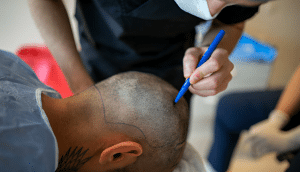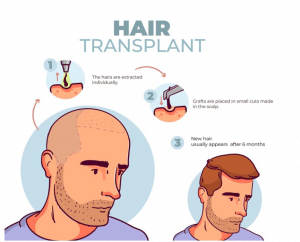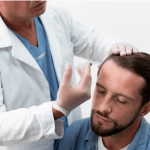Hair Transplant Safety & Clinic Hygiene Protocols at DHI International
Hair transplant has become one of the most sought-after solutions for hair loss, offering natural and permanent results. But while the procedure itself is medically advanced and safe, the success of a hair transplant heavily depends on clinic hygiene and safety protocols.
At DHI International Medical Group, all clinics worldwide, including DHI India, adhere to strict, standardized hygiene and safety protocols to ensure the highest quality care and outstanding results for every patient.
In this blog, we’ll walk you through the importance of safety in hair transplant surgery, potential risks, how infections can be prevented, and what makes DHI India a trusted leader in the industry.
Why Are Hair Transplant Safety and Hygiene Important?
A hair transplant involves extracting hair follicles from a donor area (usually the back of the scalp) and implanting them into the thinning or balding area. While this is a minimally invasive procedure, the risk of complications increases significantly if proper hygiene and safety measures are not followed.
Along with a skilled surgeon, the clinic environment must be sterile, sanitized, and safe to prevent infections and ensure high graft survival rates.
Common Concerns About Hair Transplant Risks
What Are the Risks of Hair Transplant Surgery?
Hair transplants are generally safe, especially when performed by certified and experienced doctors. However, healing responses may vary from person to person. Mild side effects like swelling, redness, or discomfort are common and usually temporary.
But if the clinic lacks proper safety standards, it may lead to serious issues like infections, excessive bleeding, or scarring. Always know who is performing the surgery and what protocols are in place for patient safety.

Can Hair Transplants Cause Infections?
While DHI’s advanced techniques and sterile environment greatly reduce infection risk, no surgery is completely risk-free. Infections usually occur when:
- The procedure is performed in an unsanitary setting.
- The instruments used are not properly sterilized.
- Post-procedure care is neglected.
Signs of infection include:
- Persistent swelling or redness
- Unusual discomfort
- Bleeding or pus formation
Immediate medical attention is required in such cases.
Dangers of Hair Transplant Infections
If left untreated, an infection can damage both the donor and recipient areas, leading to poor hair growth, scarring, and even failure of the transplant. In severe cases, patients may require corrective surgery.
How to Prevent Infections During Hair Transplants?
Preventing infection starts with choosing the right clinic. Here are some key points to consider:
- Ensure the clinic follows international hygiene standards.
- Check for disposable tools and garments used during the procedure.
- Read patient reviews and clinic ratings.
- Confirm whether the doctors are certified and experienced.
- Book a pre-consultation to assess the cleanliness of the facility.
Post-surgery, avoid touching your scalp, do not pick scabs, and attend all follow-up appointments.

What Makes DHI International the Safest Hair Transplant Chain of Clinics?
At DHI International hair transplant clinics, we follow UK CQC and ISO-approved protocols to ensure maximum safety and hygiene. Here’s how we maintain the highest standards across all our clinics:
- Sterile Environment
- Entire surgery room, tools, chairs, and surroundings are fully sanitized before and after every procedure.
- All surgical instruments are disposable and single-use to prevent cross-contamination.
- Patented titanium-coated punches up to 1mm are used for precise extraction with zero scarring.
- Doctor-Led Procedures Only
- All procedures are performed from start to finish by qualified DHI-certified surgeons, not technicians.
- Protective Gear for All
- Surgeons wear sterile gloves, surgical masks, gowns, and shoe covers.
- Patients receive single-use disposable garments which are discarded post-procedure.
- Advanced Risk Management
- Emergency kits are available in every operating room.
- Clinics undergo routine hygiene audits and deep cleaning.
- Safe Equipment & High-Quality Tools
- We use ultra-sharp, high-grade syringes and needles to minimize trauma and infection.
- Hair follicles are preserved in special solutions using precision tools and global standards like ADT & MET for maximum graft survival.
- COVID-19 or any Viral Infection Safety Protocols
- All staff members are fully vaccinated.
- Patients are asked to submit a COVID-19 test or any Viral infection test report before the procedure.
- Post-Procedure Support
- We provide complete aftercare support, including scalp hygiene tips, medications, and follow-up consultations to ensure the best outcome.
Choose Safety First — Choose DHI Hair Transplant Technique
When selecting a hair transplant clinic, safety and hygiene should never be compromised. At DHI International, our mission is to deliver 100% safe, effective, and natural-looking hair restoration, backed by science and strict safety protocols.
✅ International hygiene standards
✅ Doctor-only procedures
✅ Highest graft survival rates
✅ No visible scarring
✅ Complete post-operative support
Book Your Consultation Today
Ready to start your hair restoration journey with complete peace of mind? Contact DHI International to learn more about our hair transplant procedures and how we prioritize your safety at every step.
DHI International Medical Group – Trusted by millions worldwide for safe, permanent, and natural hair transplant results.






